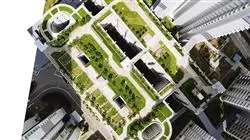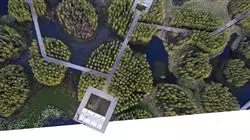University certificate
Scientific endorser

The world's largest faculty of engineering”
Introduction to the Program
Enroll now in this Masters Degree and stand out as a cutting-edge engineer, deepening in Biology and ecology of the landscape, Arboriculture and Ecosystem Restoration”

Lead the urban change of the future with the keys provided by this Masters Degree, developed by the best experts in Sustainable Green Infrastructures”
This Masters Degree in Design of Sustainable Green Infrastructures contains the most complete and up-to-date program on the market. The most important features include:
- The development of case studies presented by experts in Design of Sustainable Green Infrastructures
- The graphic, schematic, and practical contents with which they are created, provide practical information on the disciplines that are essential for professional practice
- Practical exercises where self-assessment can be used to improve learning
- Its special emphasis on innovative methodologies
- Theoretical lessons, questions to the expert, debate forums on controversial topics, and individual reflection assignments
- Content that is accessible from any fixed or portable device with an Internet connection
Delve into the design of ecological functionalities, tools for monitoring environmental status and management models to improve the habitability of the most avant-garde”
The program’s teaching staff includes professionals from the sector who contribute their work experience to this educational program, as well as renowned specialists from leading societies and prestigious universities.
Its multimedia content, developed with the latest educational technology, will provide the professionals with situated and contextual learning, i.e., a simulated environment that will provide an immersive education programmed to learn in real situations.
The design of this program focuses on Problem-Based Learning, by means of which the professionals must try to solve the different professional practice situations that are presented throughout the academic course. For this purpose, the students will be assisted by an innovative interactive video system created by renowned experts.
Enroll now in this program and do not miss the opportunity to analyze, through practical and real cases, the most successful models of sustainable urban infrastructure today”

Access all the material whenever you want from any device with Internet connection”
Why study at TECH?
TECH is the world’s largest online university. With an impressive catalog of more than 14,000 university programs available in 11 languages, it is positioned as a leader in employability, with a 99% job placement rate. In addition, it relies on an enormous faculty of more than 6,000 professors of the highest international renown.

Study at the world's largest online university and guarantee your professional success. The future starts at TECH”
The world’s best online university according to FORBES
The prestigious Forbes magazine, specialized in business and finance, has highlighted TECH as “the world's best online university” This is what they have recently stated in an article in their digital edition in which they echo the success story of this institution, “thanks to the academic offer it provides, the selection of its teaching staff, and an innovative learning method aimed at educating the professionals of the future”
A revolutionary study method, a cutting-edge faculty and a practical focus: the key to TECH's success.
The most complete study plans on the university scene
TECH offers the most complete study plans on the university scene, with syllabuses that cover fundamental concepts and, at the same time, the main scientific advances in their specific scientific areas. In addition, these programs are continuously being updated to guarantee students the academic vanguard and the most in-demand professional skills. In this way, the university's qualifications provide its graduates with a significant advantage to propel their careers to success.
TECH offers the most comprehensive and intensive study plans on the current university scene.
A world-class teaching staff
TECH's teaching staff is made up of more than 6,000 professors with the highest international recognition. Professors, researchers and top executives of multinational companies, including Isaiah Covington, performance coach of the Boston Celtics; Magda Romanska, principal investigator at Harvard MetaLAB; Ignacio Wistumba, chairman of the department of translational molecular pathology at MD Anderson Cancer Center; and D.W. Pine, creative director of TIME magazine, among others.
Internationally renowned experts, specialized in different branches of Health, Technology, Communication and Business, form part of the TECH faculty.
A unique learning method
TECH is the first university to use Relearning in all its programs. It is the best online learning methodology, accredited with international teaching quality certifications, provided by prestigious educational agencies. In addition, this disruptive educational model is complemented with the “Case Method”, thereby setting up a unique online teaching strategy. Innovative teaching resources are also implemented, including detailed videos, infographics and interactive summaries.
TECH combines Relearning and the Case Method in all its university programs to guarantee excellent theoretical and practical learning, studying whenever and wherever you want.
The world's largest online university
TECH is the world’s largest online university. We are the largest educational institution, with the best and widest online educational catalog, one hundred percent online and covering the vast majority of areas of knowledge. We offer a large selection of our own degrees and accredited online undergraduate and postgraduate degrees. In total, more than 14,000 university degrees, in eleven different languages, make us the largest educational largest in the world.
TECH has the world's most extensive catalog of academic and official programs, available in more than 11 languages.
Google Premier Partner
The American technology giant has awarded TECH the Google Google Premier Partner badge. This award, which is only available to 3% of the world's companies, highlights the efficient, flexible and tailored experience that this university provides to students. The recognition as a Google Premier Partner not only accredits the maximum rigor, performance and investment in TECH's digital infrastructures, but also places this university as one of the world's leading technology companies.
Google has positioned TECH in the top 3% of the world's most important technology companies by awarding it its Google Premier Partner badge.
The official online university of the NBA
TECH is the official online university of the NBA. Thanks to our agreement with the biggest league in basketball, we offer our students exclusive university programs, as well as a wide variety of educational resources focused on the business of the league and other areas of the sports industry. Each program is made up of a uniquely designed syllabus and features exceptional guest hosts: professionals with a distinguished sports background who will offer their expertise on the most relevant topics.
TECH has been selected by the NBA, the world's top basketball league, as its official online university.
The top-rated university by its students
Students have positioned TECH as the world's top-rated university on the main review websites, with a highest rating of 4.9 out of 5, obtained from more than 1,000 reviews. These results consolidate TECH as the benchmark university institution at an international level, reflecting the excellence and positive impact of its educational model.” reflecting the excellence and positive impact of its educational model.”
TECH is the world’s top-rated university by its students.
Leaders in employability
TECH has managed to become the leading university in employability. 99% of its students obtain jobs in the academic field they have studied, within one year of completing any of the university's programs. A similar number achieve immediate career enhancement. All this thanks to a study methodology that bases its effectiveness on the acquisition of practical skills, which are absolutely necessary for professional development.
99% of TECH graduates find a job within a year of completing their studies.
Master's Degree in Design of Sustainable Green Infrastructures
Discover the Master’s Degree in Design of Sustainable Green Infrastructures at TECH Global University and transform the world through the power of design and sustainability. Are you ready to explore new frontiers and acquire cutting-edge skills in the field of sustainable infrastructure design? Imagine the unique opportunity to specialize with world-renowned experts in a state-of-the-art virtual environment. Our program offers a dynamic and enriching learning experience where you can interact with outstanding professionals and fellow students passionate about sustainable design. Our teaching staff is composed of industry leaders who will share their practical experience and in-depth knowledge with you. You will be immersed in a collaborative environment where you can discuss innovative ideas and receive personalized feedback to enhance your professional growth. Throughout the program, you will explore the fundamentals of sustainable green infrastructure design and develop specialized skills in areas such as sustainable urban planning, green space design, water management, and the preservation of natural resources.
Prepare to shape a greener and more resilient future
The main goal of this master’s degree is to train highly skilled professionals in the design and implementation of sustainable solutions within the field of green infrastructure. Our program aims to provide you with the knowledge and competencies needed to face current and future challenges in urban development and environmental preservation. Upon completion, you will receive a certificate from TECH Global University, validating your expertise in sustainable green infrastructure design. This internationally recognized certification will open doors to exciting career opportunities in government agencies, design and consulting firms, and sustainability-focused organizations. Don’t miss the chance to join this forward-thinking program and become a leader of change toward a more sustainable future. Join TECH and discover how green infrastructure design can help reshape the world.







